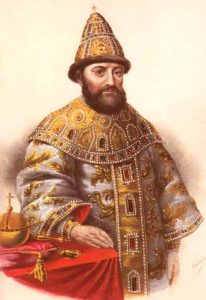(1613 – 1645)

House of the Romanovs
Mikhail Fedorovich, the son of Theodore Nikitich Romanov, before his election to the throne, he lived with his mother, the nun Martha, in the Ipatiev Monastery, near Kostroma.
On February 21, 1613, he was elected tsar in the great Zemsky Sobor.
When he joined the throne, the position of the Russian land was sad. The state treasury is empty. Inside the state, Cossack gangs and Poles were robbing. In Astrakhan were Zarutskiy with Marina Mnishek, Smolensk – in the hands of the Poles. Prince Vladislav wanted to occupy the throne of Moscow. Novgorod was owned by the Swedes.
Mikhail Fedorovich pacified all enemies internal and external. The first thing the assembled Zemsky Sobor sent on behalf of the tsar sent letters to all major cities with the request to send money, bread and other supplies for distribution to the army.
The extermination of the Cossacks began. Zarutskiy was captured in Astrakhan and, along with Marina’s son, Mnishek was executed, Marina was imprisoned. The war with the Swedes ended with the Stolbovoi world (1617), in which the Swedes returned to Russia Novgorod, Staraya Russa, Gdov, Porkhov and Ladoga, but retained Ingria – the coast of the Gulf of Finland with the cities of Yam, Ivangorod and Oreshek and, in addition, Russia 20 thousand rubles.
The pillar treaty completely removed the Russians from the Baltic Sea, which was necessary for relations with the West.
In 1618, a truce was concluded with Poland in the village of Deulin. Under this agreement Smolensk and Seversk region were ceded to Poland. But Vladislav did not abandon his claims to the Moscow throne. There was an exchange of prisoners, among whom returned to Moscow the father of the Emperor, Metropolitan Filaret, who was consecrated to the patriarchs.
Filaret was the full head of Michael until his death (1619 – 1633). In the state charters of the time, they usually wrote: “The Tsar and the Grand Duke Mikhail Fedorovich of All Russia and the Great Sovereign Patriarch Filaret Nikitich of Moscow and All Russia have indicated …”
Internal activities of the tsar and the patriarch turned to the arrangement of the state order. Collecting taxes was difficult, because many cities were ruined, the residents fled. From everywhere, complaints were received about grievances from the governor.
It was decided to write scribe books and distribute taxes according to the property of the residents, for which scribes and scouts were sent to the provinces. Voevoda and the orderly were forbidden to take bribes. Some regions were allowed to choose headmen instead of the governor.
After the Deuline truce, Mikhail began to prepare actively for the war, since it was difficult for him to cede Poland to Smolensk, and on the other hand Poland did not recognize Michael as tsar, and Vladislav did not renounce his claims to the Moscow throne.
Taking advantage of the interregnum on the death of Sigismund, Moscow sent an army under the command of Shein, who besieged Smolensk. But with the arrival of Vladislav, chosen by the king, was repulsed. When the position of the Moscow army became desperate, Shein surrendered to capitulation. Upon his return to Moscow, he was accused of treason and executed.
Vladislav, having failed in the fortress of Bely and threatened by Turkey, concluded peace with Russia on the Polyanykovka River in 1634. Under the terms of this world, Vladislav refused to claim the throne of Moscow. Smolensk and Seversk land remained behind Poland, and Vladislav paid 20 thousand rubles. In Moscow, the remains of the deceased and buried in Poland Tsar Vasily Shuisky, who was buried in the Archangel Cathedral among Russian princes, was transferred to Moscow.
Don Cossacks, taking the Turkish fortress of Azov, asked Michael to take them under their own high hand and send them an army to help. Since this assistance to the Cossacks would have been the cause of the war with Turkey, the tsar convened the Zemsky Sobor (1642), from whose answers it turned out that the state does not have the means to fight. Therefore, Mikhail ordered the Cossacks to leave Azov, and the sultan said that because of the Cossacks, he did not want to quarrel with him.
During the reign of Mikhail Fyodorovich, relations with foreign powers were renewed, the government ordered the Russian people to train foreign forces. Attention was also drawn to education and the development of factory business in Russia. There are factories for casting guns near Tula on the Kostroma and Sheksna rivers, in Moscow a glass plant.
Mikhail Fedorovich was married twice, on Maria Vladimirovna Dolgorukaya and on Evdokia Streshneniy. From the second marriage had a son Alexei and three daughters.
June 12, 1645, Mikhail Fyodorovich died.